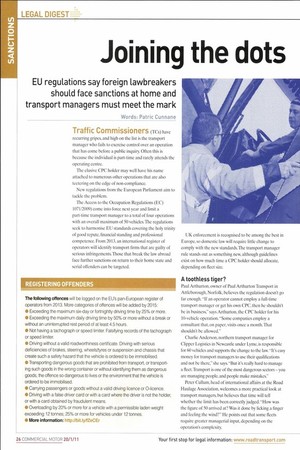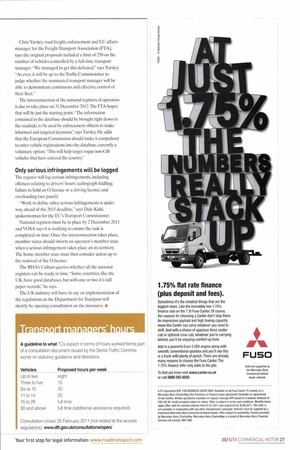Joining the dots
Page 26

Page 27

If you've noticed an error in this article please click here to report it so we can fix it.
EU regulations say foreign lawbreakers should face sanctions at home and transport managers must meet the mark
Words: Patric Cunnane
Traffic Commissioners (TCs) have recurring gripes, and high on the list is the transport manager who fails to exercise control over an operation that has come before a public inquiry. Often this is because the individual is part-time and rarely attends the operating centre.
The elusive CPC holder may well have his name attached to numerous other operations that are also teetering on the edge of non-compliance.
New regulations from the European Parliament aim to tackle the problem.
The Access to the Occupation Regulations (EC) 1071/2009) come into force next year and limit a part-time transport manager to a total of four operations with an overall maximum of 50 vehicles. The regulations seek to harmonise EU standards covering the holy trinity of good repute, financial standing and professional competence. From 2013, an international register of operators will identify transport firms that are guilty of serious infringements. Those that break the law abroad face further sanctions on return to their home state and serial offenders can be targeted. UK enforcement is recognised to be among the best in Europe, so domestic law will require little change to comply with the new standards. The transport manager rule stands out as something new, although guidelines exist on how much time a CPC holder should allocate, depending on fleet size.
A toothless tiger?
Paul Arthurton, owner of Paul Arthurton Transport in Attleborough, Norfolk, believes the regulation doesn't go far enough. "If an operator cannot employ a full-time transport manager or get his own CPC, then he shouldn't be in business," says Arthurton, the CPC holder for his 10-vehicle operation. "Some companies employ a consultant that, on paper, visits once a month. That shouldn't be allowed."
Charlie Anderson, northern transport manager for Clipper Logistics in Newcastle under Lyme, is responsible for 60 vehicles and supports the change to the law. "It's easy money for transport managers to use their qualifications and not be there," she says "But it's really hard to manage a fleet. Transport is one of the most dangerous sectors — you are managing people, and people make mistakes" Peter Cullum, head of international affairs at the Road Haulage Association, welcomes a more practical look at transport managers, but believes that time will tell whether the limit has been correctly judged. "How was the figure of 50 arrived at? Was it done by licking a finger and feeling the wind?" He points out that some fleets require greater managerial input, depending on the operation's complexity. Chris Yarsley, road freight, enforcement and EU affairs manager for the Freight Transport Association (FTA), says the original proposals included a limit of 250 on the number of vehicles controlled by a full-time transport manager. "We managed to get this defeated," says Yarsley. "As ever, it will be up to the Traffic Commissioner to judge whether the nominated transport manager will be able to demonstrate continuous and effective control of their fleet."
The interconnection of the national registers of operators is due to take place on 31 December 2012. The FTA hopes that will be just the starting point. "The information contained in the database should be brought right down to the roadside, to be used by enforcement officers to make informed and targeted decisions," says Yarsley. He adds that the European Commission should make it compulsory to enter vehicle registrations into the database, currently a voluntary option. "This will help target rogue non-GB vehicles that have entered the country."
Only serious infringements will be logged
The register will log serious infringements, including offences relating to drivers' hours; tachograph fiddling; failure to hold an 0-licence or a driving licence; and overloading (see panel).
"Work to define other serious infringements is under way, ahead of the 2015 deadline," says Dale Kidd, spokeswoman for the EC's Transport Commissioner.
National registers must be in place by 2 December 2011 and VOSA says it is working to ensure the task is completed on time. Once the interconnection takes place, member states should inform an operator's member state when a serious infringement takes place on its territory. The home member state must then consider action up to the removal of the 0-licence.
The RHA's Cullum queries whether all the national registers can be ready in time. "Some countries, like the UK, have good databases, but with one or two it's still paper records," he says.
The UK industry will have its say on implementation of the regulations as the Department for Transport will shortly be opening consultation on the measures. •
































































































































